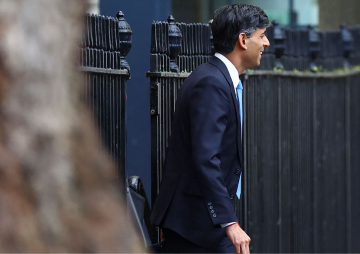THE coverage of the recent BRICS Summit at Sanya (China) in the Western media in particular raised questions about the relevance or utility of the grouping. For example, Phillip Bowring, a reputed commentator writing in The New York Times, called BRICS "a real gang of five, or just a list of nations with no common agenda other than a shared resentment of the United States" and added "this was a summit meeting the emerging world does not need".
On the other hand, an article in Pravda noted that with the rise of BRICS, "the season is ending in which two or three Western powers - UN Security Council permanent members - could meet in a room and come out of there ostensibly speaking on behalf of the international community."
Both judgments are premature and in need of a good deal of tempering: for BRICS is still a very new grouping, trying to find its niche area at the global stage. This was only the third summit (and the first with membership just expanded to five to include South Africa).
Clearly, there is no particular glue holding the five members together; they differ with one another on a number of matters. India, for example, bears no resentment against and, in fact, is engaged in forging a closer relationship with the United States. On the other hand, at least in the matter of political organisation and the system of government, India has little in common with China.
All the five countries - Brazil, Russia, India, China and South Africa - are at different stages of economic development, and the group defies the fixed templates of international groupings. Unlike the European Union, ASEAN or SAARC, BRICS does not fit into any of the defining characteristics of a grouping - shared ideology, common values, regional contiguity or cohesion, converging security interests, or identical economic interests and policies.
It is a new idea in a new international context, and even as all BRICS member-countries aspire for a larger role in the world, they approach the task in varied ways and in differing partnerships or alliances, etc. They have one thing in common though: they are all rising economies.
It is widely recognised that after the global financial crisis of 2008, the international financial system and its management need serious improvements. In the major task of securing changes in the decision-making processes in the International Monetary Fund (IMF) and the World Bank, the concerted approach of these rising economies played a role that has re-aligned the functioning of an outdated system somewhat closer to the present-day reality and current needs. The recent increase in the voting power of developing countries in the IMF and the World Bank is a testimony to BRICS' relevance.
BRICS is not a political or power bloc, and it does not project itself as such. As of now, it is not even envisaging a formal structure with a secretariat. The fear in the West that within the G-20 the BRICS countries might form a bloc is equally misplaced. India, for example, has maintained that in G-20 the member-countries' leaders participate in their individual capacities. India also prefers decisions by consensus. It is in nobody's interest to split G-20 along the lines of the OECD/non-OECD or the old versus the emerging economies.
Dethronement of the US dollar has sometimes been wrongly projected as one of the goals of BRICS. A glance at the foreign exchange reserves of the five countries will show how exaggerated the notion is. China, for example, holds more than 3 trillion dollars in denominated US government bonds and other Instruments. Any precipitous decline in the value of the US dollar would seriously erode the net worth of the assets of the five countries.
Perhaps, no country other than China sees the Chinese Renminbi (Yuan) replacing the dollar as the global currency in the foreseeable future. The Special Drawing Rights (SDRs) have been talked about for some time as an alternative, but that too is something for a distant future. Increasing the quantum of the SDRs in requisite measure and revising the basket of SDR currencies will take time.
At the Sanya summit, the development banks of the five countries signed an agreement to extend credits to each other in their national currencies, and a small step in this direction has already been taken between China and Russia. But it is not certain that the idea will gather momentum.
There are serious differences among the BRICS countries on trade deficits between China and the rest. The Yuan exchange rate is of concern not only to the US, but also to India, Brazil and South Africa whose exports to third markets are becoming uncompetitive due to the under-valued Yuan.
On the question of the expansion of permanent membership of the UN Security Council, in which Brazil, India and South Africa are interested, China is not willing to commit unequivocal support. Reaction and responses differ also in regard to vital political issues of our time such as the Arab uprisings against dictatorial regimes in West Asia.
Differences have emerged among its members even in regard to the composition and functioning of the grouping. Whereas Russia is for deepening cooperation to consolidate the grouping with a formal structure, China prefers its expansion to include countries like Turkey, Mexico, South Korea and Indonesia.
The effects of BRICS' overlap of membership and interests with blocs like IBSA (India-Brazil-South Africa), RIC (Russia-India-China) and BASIC (Brazil-South Africa-India-China) are not yet clear. Each has a niche area of expertise. Of the three, RIC will probably be absorbed in BRICS sooner or later. IBSA has some inherent cohesion because of its members' shared values and interests and their similar socio-economic problems about which they can learn from each other's experience.
BRICS is an evolving process, and any exaggerated notion of it becoming a power bloc will be out of place. It might work towards "a multi-polar (or poly-centric) world", which a former Brazilian President had described as an important goal of BRICS, but in no sense is it a ganging-up against the US or the West.
It is a five-nation forum for consultation and concerted action on specific economic and social issues of global significance. At the Sanya summit the leaders rightly decided to "advance cooperation in a gradual and pragmatic manner, making it inclusive and non-confrontational."
Some reports in the Indian media wrongly stated that South Africa's inclusion in the forum was due to China's initiative or insistence. The move, in fact, was initiated by India at a Track 2 meeting of BRIC think-tanks at the Observer Research Foundation (ORF) in New Delhi in May 2009. That meeting was organised by the ORF to prepare recommendations for the summit's consideration, and its recommendation for South Africa's induction was accepted by the summit. After that China as the summit's host formally invited South Africa to join BRICS.
Mr Rasgotra is a former Foreign Secretary and currently the President of the Centre for International Relations at the Observer Research Foundation (ORF). Mr Viswanathan served as India's Ambassador in many African countries and is currently working at the ORF
Courtesy: The Tribune
The views expressed above belong to the author(s). ORF research and analyses now available on Telegram! Click here to access our curated content — blogs, longforms and interviews.




 PREV
PREV

